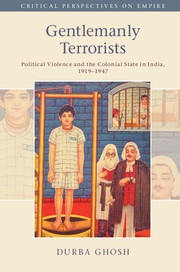Crossref Citations
This Book has been
cited by the following publications. This list is generated based on data provided by Crossref.
Silvestri, Michael
2017.
‘A Fanatical Reverence for Gandhi’: Nationalism and Police Militancy in Bengal during the Non-cooperation Movement.
The Journal of Imperial and Commonwealth History,
Vol. 45,
Issue. 6,
p.
969.
McClure, Alastair
and
Saxena, Saumya
2018.
Introduction.
Comparative Studies of South Asia, Africa and the Middle East,
Vol. 38,
Issue. 3,
p.
367.
Ghosh, Durba
2018.
The Terrorist and his Jailor: The Conundrum of Friendship and Intimacy.
Itinerario,
Vol. 42,
Issue. 1,
p.
102.
McClure, Alastair
2018.
Sovereignty, Law, and the Politics of Forgiveness in Colonial India, 1858–1903.
Comparative Studies of South Asia, Africa and the Middle East,
Vol. 38,
Issue. 3,
p.
385.
Ghosh, Durba
2019.
Whither India? 1919 and the Aftermath of the First World War.
The Journal of Asian Studies,
Vol. 78,
Issue. 2,
p.
389.
Owen, Nicholas
2019.
Democratisation and the British Empire.
The Journal of Imperial and Commonwealth History,
Vol. 47,
Issue. 5,
p.
974.
Amstutz, Andrew
Elam, Daniel
Choudhury, Rishad
Banerjee, Mou
De, Rohit
Silvestri, Michael
Maclean, Kama
and
Ghosh, Durba
2019.
New histories of political violence and revolutionary terrorism in modern South Asia.
South Asian History and Culture,
Vol. 10,
Issue. 3,
p.
340.
Condos, Mark
2020.
The Indian ‘Alsatia’: Sovereignty, Extradition, and the Limits of Franco-British Colonial Policing.
The Journal of Imperial and Commonwealth History,
Vol. 48,
Issue. 1,
p.
101.
Siddiqi, Dina M.
2020.
Logics of Sedition: Re-signifying Insurgent Labour in Bangladesh’s Garment Factories.
Journal of South Asian Development,
Vol. 15,
Issue. 3,
p.
371.
2020.
A Hygienic City-Nation.
p.
201.
Raza, Ali
2020.
Revolutionary Pasts.
Pennybacker, Susan
2020.
“Fire by Night, Cloud by Day”: Exile and Refuge in Postwar London.
Journal of British Studies,
Vol. 59,
Issue. 1,
p.
1.
Ben-Natan, Smadar
2021.
The dual penal empire: Emergency powers and military courts in Palestine/Israel and beyond.
Punishment & Society,
Vol. 23,
Issue. 5,
p.
741.
Pernau, Margrit
2021.
Emotions and Temporalities.
Choudhury, Rishad
2022.
Wahhabis without Religion; or, A Genealogy of Jihadis in Colonial Law, 1818 to 1857.
Comparative Studies of South Asia, Africa and the Middle East,
Vol. 42,
Issue. 2,
p.
404.
Nakissa, Aria
2022.
Liberalism's distinctive policy for governing Muslim populations: Human rights, religious reform, and counter‐terrorism from the colonial era until the present.
History Compass,
Vol. 20,
Issue. 9,
Dixit, Priya
2022.
Race, Popular Culture, and Far-right Extremism in the United States.
p.
23.
Dixit, Priya
and
Miller, Kathryn
2022.
Erasing historical violence from the study of violent extremism: Memorialization of white supremacy at Stone Mountain, United States.
Critical Studies on Terrorism,
Vol. 15,
Issue. 1,
p.
61.
Shetty, Sandhya
2022.
Nations must be defended: public health, enmity and immunity in Katherine Mayo’sMother India.
Medical Humanities,
Vol. 48,
Issue. 2,
p.
144.
Roy, Baijayanti
2023.
Religious Entanglements Between Germans and Indians, 1800–1945.
p.
253.





